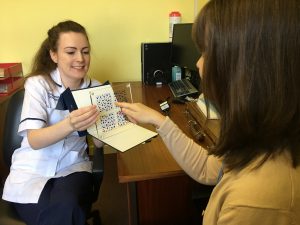Vision and learning are intimately related – at least 80% of what a child learns in school is via information that is presented visually. Visual impairment can impede the development of motor skills, cognition, and language. Therefore, good vision is essential for students of all ages to reach their full academic potential.
 For many adults, their childhood squint has had a significant effect on their psychological wellbeing. Studies have shown that adults with a squint can be discriminated against during recruitment interviews, overlooked for promotion and are less likely to find a partner (Am J Ophthalmol 2007 Nov). Similarly, adults experiencing recent onset visual disturbances eg double vision will have their mobility and daily living activities such as reading and driving severely affected.
For many adults, their childhood squint has had a significant effect on their psychological wellbeing. Studies have shown that adults with a squint can be discriminated against during recruitment interviews, overlooked for promotion and are less likely to find a partner (Am J Ophthalmol 2007 Nov). Similarly, adults experiencing recent onset visual disturbances eg double vision will have their mobility and daily living activities such as reading and driving severely affected.
An Orthoptist assesses diagnoses and treats visual function problems, abnormalities of eye movements and dysfunction of eye co-ordination in children and adults, such as squint, amblyopia/lazy eye and double vision. Orthoptic management aims to achieve the maximum visual potential and to relieve symptoms associated with poor eye control. Orthoptic treatment may be a combination of occlusion, eye exercises, optical, pharmacological or surgical intervention (undertaken by an Ophthalmologist) based on the Orthoptist’s assessment.

Their specialised training enables them to assess the visual function in the non-verbal patient e.g. those with special needs or poor communication skills.
The Orthoptic profession in many areas also provides extended roles within the eye care team such as pre and post-op cataract assessment and Glaucoma monitoring.
Orthoptists improve the lives of those affected by specific eye problems which would otherwise limit them in their everyday activities and could have a profound effect on career choice and quality of life.
Locations where this service is delivered
Contacts
Head of Service
Clare Stevenson




